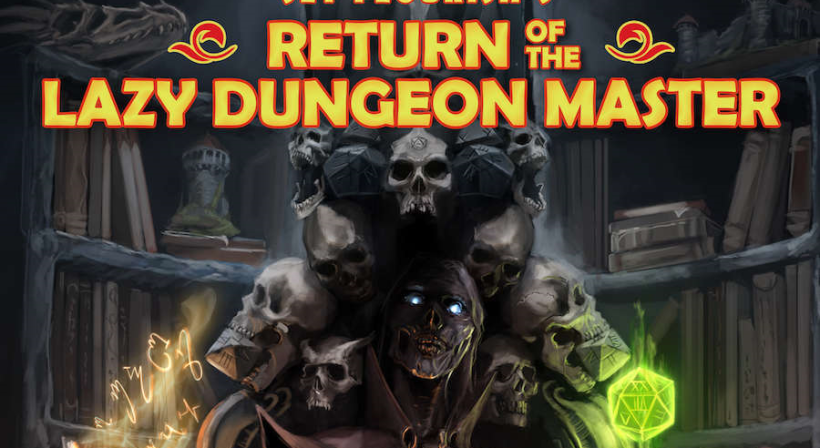The first time I felt like I really got better as a DM was when I read The Lazy Dungeon Master by Michael Shea. The book outlined some very interesting ideas that helped me make the plunge into running my own content instead of relying on published adventures. I read it in one night because it was revolutionary in my mind. Then Michael Shea released a follow up to the first book called “Return of the Lazy Dungeon Master” and I bought it immediately. This is my opinion of the book.
Presentation of Return of the Lazy Dungeon Master
The book is truly beautiful. The cover art is done by Jack Kaiser while the interior art is by Pedro Potier. The layout is concise and easy to read, while also being easy to skim and reference when needed. I’ve gone back to this book after I had finished reading it multiple times and found what I was looking for pretty easily.
The first chapter acts as an intro to the Lazy DM method while the second one is a summary of the ideas outlined in the book.
What is the Lazy DM Method?
Michael Shea is a known dungeon master who mainly writes on his blog (slyflourish.com) about role-playing and being a DM and he was one of the inspirations for starting this blog. He believes that over-preparing is a DMing sin and will lead to worse games for both the players and the DM.
His first book outlined a few ideas on how to prep for your sessions fast while maximizing the fun that can be had on the table. He suggested using a few index cards to write down all the necessary information of your next session which are Locations, NPCs and Monsters and improvising the rest depending on your player’s choices.
In Return of the Lazy Dungeon Master, he keeps some of the key ideas but introduces a new one; that of secrets and clues. Basically a list of ten or so pieces of info that your players will find out about during the session. How they will come across this information isn’t important and can be improvised.
His list of “actions” when prepping for a D&D session comes down to:
- Reviewing the characters
- Creating a strong start
- Outlining potential scenes
- Defining secrets and clues
- Developing fantastic locations
- Outlining important NPCs
- Choosing relevant monsters
- Selecting magic item rewards
Most of the items in the list can be skipped as he explains in the book. It should also be noted that the Lazy DM method isn’t just about shaving off time from your session prep, but a way to spend time where it really matters (Locations and NPCs instead of a predetermined plot).
What else can be found in Return of the Lazy Dungeon Master?
The first few and longest chapters are about preparing your next session, but the rest of the 100-page book is choke-full of tips and ideas about running the game.
Chapters 18-24 are all about running the game, tips and techniques on how to improvise NPCs and scenes while maintaining a consistent pace throughout the game.
Chapters 25-29 are general ideas about being a DM and improving at your craft. It provides ways to prime your brain as a DM, and brain exercises that will help improve your game among stuff like tricks you can use and a helpful chapter about developing your own DMing style.
And last but not least, the last 10 or so pages are Survey results from DMs around the world about several different topics. Definitely worth a read.
Who is the book for?
I think Return of the Lazy Dungeon Master can be useful for everyone; from newbies to experienced Dungeon Masters. I happened to read it closer to when I was starting to DM and found that it challenged my preconceived notions about being a Dungeon Master and about what truly matters in the game.
Have I used everything in the book to the letter? No, I took what works best for me and my players and changed what didn’t. But I still look to this book when I need to remember what is important and what is not. Take any such book for what it is and not as a gospel and you’ll be fine.
Where can I get the book?
Mike Shea has made the book available on Amazon as a Paperback, a Kindle version and an audiobook. Take your pick.

